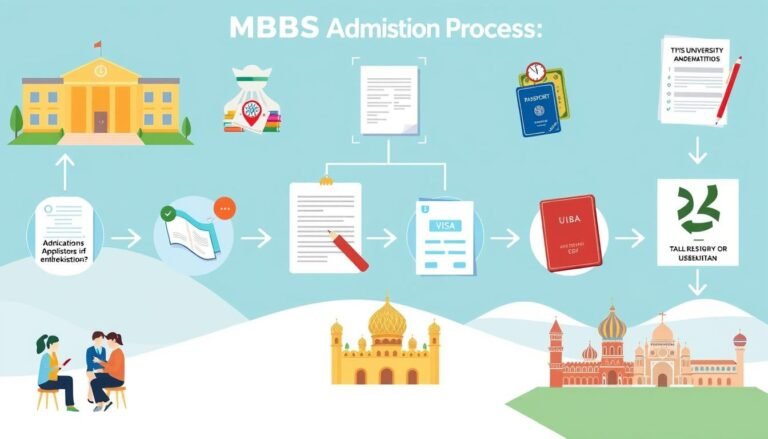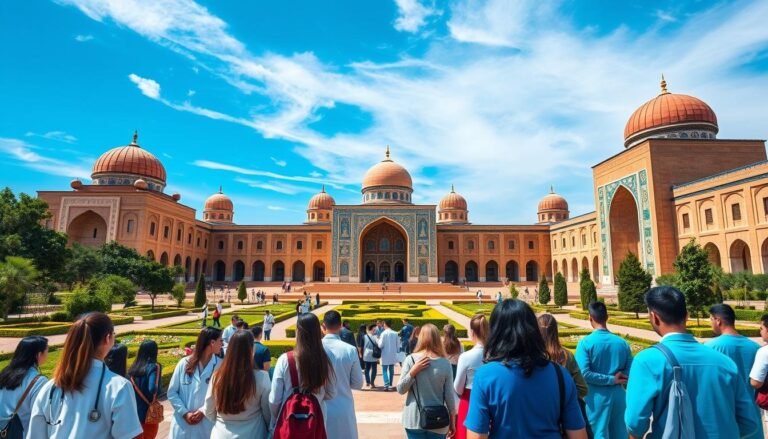Ranking of Medical Universities in Uzbekistan
What makes Uzbekistan a hidden gem for aspiring medical students? This Central Asian nation is rapidly emerging as a hub for quality medical education at affordable prices. With a growing number of renowned institutions, Uzbekistan is attracting students from across the globe seeking top-notch medical training.

We’ve seen a surge in interest, with over 7,000 Indian students alone pursuing various courses in Uzbekistan. The country boasts several esteemed medical universities, each offering unique strengths and specializations. Samarkand State Medical University, founded in 1930, stands out as the top-ranked medical school in the country.
For those considering medical education in Uzbekistan, it’s crucial to understand the ranking of medical universities. These rankings play a vital role in shaping student choices and influencing university funding. As we delve into the world of medical education in Uzbekistan, we’ll explore the criteria behind these rankings and showcase the leading institutions shaping the future of healthcare in the region.
Join us as we uncover the factors that contribute to the reputation of Uzbekistan’s medical universities, from academic excellence to research output. We’ll examine how these rankings stack up both regionally and globally, providing valuable insights for prospective students and educators alike.
Overview of Medical Education in Uzbekistan
The uzbekistan medical education system has a rich history and continues to evolve. We explore the journey of medical studies in uzbekistan, from its roots to the present day framework.
Historical Context of Medical Training
Medical education in Uzbekistan traces back to the Soviet era. The Council of People’s Commissars of the Uzbek SSR laid the foundation for medical training in the country. This historical backdrop shaped the early stages of Uzbekistan’s medical education landscape.
Current Educational Framework
Today, the uzbekistan medical education system offers a comprehensive 5-year MBBS program taught in English. This program is recognized by prestigious organizations like WHO, NMC, and FAIMER. The education quality matches that of universities in the USA, UK, and Canada, opening doors for graduates to apply for medical licenses globally.
- English as the medium of instruction
- Affordable education costs (15-20 lakh for entire course)
- Minimum annual fee of 1600 USD
- Eligibility criteria: 17+ years old, 50% in 12th grade (Physics, Chemistry, Biology)
- Career options: practice in India or Uzbekistan, pursue postgraduate studies
Top medical universities in Uzbekistan include Samarkand State Medical University, Bukhara State Medical Institute, and Tashkent Medical Academy. These institutions offer quality education and attract a significant number of international students, particularly from India.
Importance of Medical University Rankings
Medical university rankings play a crucial role in shaping the landscape of higher education in Uzbekistan. These rankings serve as a guide for prospective students and impact the funding received by institutions. Let’s explore how rankings influence student choices and university finances.
Impact on Student Choices
Rankings of medical universities in Uzbekistan significantly influence student decisions. Top-ranked institutions like Samarkand State Medical University attract more applicants due to their reputation. This university, founded in 1930, holds the 7155th position globally and is recognized as the best medical college in Uzbekistan. Its 6-year program, including internship years, appeals to many aspiring doctors.
Influence on University Funding
The best medical colleges in Uzbekistan often receive more funding based on their rankings. Higher-ranked universities like Tashkent Medical Academy, established in 1919, can attract better resources. This leads to improved facilities, research opportunities, and international collaborations, further enhancing their reputation.
| University | Established | Global Ranking | Program Duration |
|---|---|---|---|
| Samarkand State Medical University | 1930 | 7155 | 6 years |
| Tashkent Medical Academy | 1919 | Top 2,500 | 6 years |
| Andijan State Medical Institute | 1955 | Not Available | 6 years |
Rankings also impact international recognition. Samarkand State Medical University, for example, collaborates with institutions from the United States, Germany, and Spain. This global network enhances the value of degrees from Uzbekistan’s medical universities, making graduates more competitive in the job market.
Criteria for Ranking Medical Universities
When evaluating prestigious medical institutes in Uzbekistan, we consider several key factors. These criteria help determine the quality of Uzbekistan medical degree programs and shape university rankings.
Academic Reputation
A university’s academic standing plays a crucial role in rankings. We look at the quality of education, curriculum design, and teaching methods. Samarkand State Medical University, for example, ranks among the top 20 universities in Uzbekistan. With 648 teachers and professors serving 11,479 students, including 2,270 international students, it showcases a strong academic environment.
Research Output
Research contributions significantly impact a university’s ranking. We assess the quantity and quality of published works, innovations, and scientific breakthroughs. Samarkand State Medical University boasts 74 departments and 75 multimedia auditoriums, providing ample resources for research activities.
Faculty Credentials
The qualifications and expertise of faculty members are vital in determining a university’s ranking. We evaluate their academic backgrounds, professional experience, and ongoing contributions to their fields. At Samarkand State Medical University, the presence of 648 teachers and professors ensures a high standard of instruction.
- Student-to-faculty ratio
- International collaborations
- Facilities and infrastructure
- Student satisfaction rates
By evaluating these criteria, we can provide a comprehensive ranking of medical universities in Uzbekistan, helping prospective students make informed decisions about their education.
Top Medical Universities in Uzbekistan
Uzbekistan boasts several prestigious medical institutions that offer quality education to aspiring healthcare professionals. We’ll explore three of the top medical schools in Uzbekistan, known for their excellent programs and international recognition.
Tashkent Medical Academy
Tashkent Medical Academy stands out among the best medical colleges in Uzbekistan. Established in 1919, it offers a comprehensive 5+1 year MBBS program in English. The academy is recognized by esteemed organizations like NMC, WHO, and FAIMER. Admission requirements include NEET qualification and a minimum 50% aggregate in Physics, Chemistry, and Biology.
Samarkand State Medical University
Founded in 1930, Samarkand State Medical University is the oldest medical institution in Central Asia. It hosts 4,967 students across 8 bachelor’s programs and 371 residents in 27 master’s specialties. The university maintains partnerships with 26 basic organizations, enhancing its academic offerings and research opportunities.
Andijan State Medical Institute
Andijan State Medical Institute, established in 1955, has trained over 13,000 doctors since its inception. Like other top medical schools in Uzbekistan, it offers a 5+1 year MBBS program in English. Prospective students must be at least 17 years old and pass a university-conducted interview for admission.
These institutions provide affordable tuition fees ranging from $21,000 to $24,600 for the entire course, making them attractive options for international students seeking quality medical education in Uzbekistan.
Factors Influencing University Reputation
The reputation of prestigious medical institutes in Uzbekistan is shaped by several key factors. We’ll explore how these elements contribute to the standing of medical universities within the Uzbekistan medical education system.
Alumni Success
Graduates from top medical schools in Uzbekistan have made significant impacts in the healthcare sector. Many alumni hold prominent positions in hospitals, research facilities, and academic institutions. Their achievements reflect positively on their alma maters, enhancing the universities’ reputations.
International Collaborations
Uzbekistan’s medical universities are increasingly engaging in global partnerships. These collaborations involve faculty exchanges, joint research projects, and student mobility programs. Such international ties not only broaden the educational experience but also boost the universities’ global standings.
Community Engagement
Medical schools in Uzbekistan actively participate in community health initiatives. These programs provide valuable services to local populations while offering students hands-on experience. This engagement strengthens the bond between universities and their communities, enhancing their reputation.
| Factor | Impact on Reputation | Example |
|---|---|---|
| Alumni Success | High | Graduates in leadership roles at major hospitals |
| International Collaborations | Medium | Joint research projects with foreign universities |
| Community Engagement | Medium | Free health camps organized by medical students |
These factors collectively contribute to the reputation of medical universities in Uzbekistan. As the Uzbekistan medical education system continues to evolve, these elements will play crucial roles in shaping the global perception of its institutions.
Methodology Behind Rankings
The ranking of medical universities in Uzbekistan follows a systematic approach. We look at key factors that shape the quality of education and research at these institutions. This process helps students make informed choices about their medical education.
Data Collection Approaches
To create accurate rankings, we gather data from various sources. This includes surveys of academic experts, institutional data from universities, and external assessments. For example, Tashkent Medical Academy, a top-ranked institution, has over 6,500 students and is recognized by the World Health Organization.
Ranking System Transparency
Transparency is key in our ranking system. We consider factors like academic reputation, research output, and faculty credentials. For instance, Tashkent Medical Academy has over 6,000 academic staff, contributing to its high ranking. The annual tuition fees, which average around 3,500 USD for MBBS programs in Uzbekistan, are also taken into account.
Our ranking methodology aims to provide a fair assessment of medical universities in Uzbekistan. By looking at diverse factors, from student enrollment to international recognition, we offer a comprehensive view of each institution’s standing in the medical education landscape.
Regional Comparisons of Medical Universities
Medical education in Uzbekistan has gained significant traction in recent years. We’ve seen a surge in international students, particularly from India, choosing Uzbekistan medical degree programs. This trend reflects the growing reputation of Uzbekistan’s medical universities within Central Asia and beyond.
Rankings within Central Asia
Uzbekistan’s medical universities hold competitive positions in Central Asia. For instance, Ajou University in Tashkent boasts a reputation score of 8890, placing it among the top institutions in the region. The Tashkent Institute of Chemical Technology also shares this impressive score, underlining the country’s strong academic standing in medical education.
| University | Reputation Score |
|---|---|
| Ajou University in Tashkent | 8890 |
| Tashkent Institute of Chemical Technology | 8890 |
| Central Asian Medical University | 7942 |
| Institute of Pharmaceutical Education and Research | 7707 |
Global Context of Uzbekistan’s Medical Education
On the global stage, Uzbekistan’s medical education is gaining recognition for its quality and affordability. The country has become a top destination for international students, with over 3,000 Indian students currently pursuing medical degrees in Uzbekistan. This influx speaks volumes about the global appeal of Uzbekistan’s medical degree programs.
Tashkent Medical Academy, established in 1919, ranks 14th among medical universities with a Reputation Index of 10950. Samarkand State Medical University holds the 20th position globally, showcasing the international competitiveness of Uzbekistan’s medical education system. These rankings highlight the country’s commitment to providing high-quality medical training that meets global standards.
Challenges Faced by Medical Universities
Medical universities in Uzbekistan face unique hurdles in their quest to provide top-notch education. The uzbekistan medical education system grapples with several issues that affect the quality of learning and student experiences.
Infrastructure and Facilities
Many medical schools struggle with outdated infrastructure. Labs lack modern equipment, and libraries need updating. This impacts hands-on learning for students. Some universities, like Tashkent Medical Academy, are working to improve. They’ve built new hostels with computer rooms and sports facilities. Still, many schools lag behind in modernizing their campuses.
Adapting to Modern Medical Practices
Keeping pace with global medical advances is a major challenge. The medical university admission uzbekistan process often doesn’t reflect the latest trends in healthcare. Schools are trying to update their curricula, but progress is slow. Language barriers also hinder adopting international best practices.
Despite these hurdles, some positive changes are happening. More universities now offer MBBS programs in English. This opens doors for international students and improves global competitiveness. Schools are also focusing on practical training. They’re partnering with hospitals to give students hands-on experience.
The road ahead is long, but Uzbekistan’s medical schools are determined to overcome these challenges. With continued effort, they aim to raise their educational standards and produce world-class doctors.
Prospective Growth in Medical Education
Medical studies in Uzbekistan are experiencing significant growth. The country’s medical education sector is evolving rapidly, with new trends and government initiatives shaping its future. We’re seeing an increase in international student enrollment, with about 5,000 foreign students pursuing medical degrees in Uzbekistan during the 2022-23 academic year.
Emerging Trends in Medical Studies
Uzbekistan medical degree programs are diversifying. Top medical colleges now offer a wide range of specializations, including General Medicine, Nursing, Medical Biology, and Pharmaceutical Science. These programs cater to various interests and career paths in the medical field.
The emphasis on practical training is a key trend. Students gain hands-on clinical experience through internships and hospital rotations, preparing them for real-world medical practice. English as the primary medium of instruction is another trend, making Uzbekistan an attractive destination for international students.
Government Initiatives
The government is actively supporting the growth of medical education. Initiatives include:
- Expanding program offerings at existing universities
- Improving educational quality and infrastructure
- Facilitating international collaborations
- Introducing merit-based scholarships for international students
These efforts aim to enhance the global standing of Uzbekistan’s medical education and attract more international students. The government’s support is crucial in maintaining the recognition of Uzbek medical degrees by international bodies like the Medical Council of India.
| Aspect | Details |
|---|---|
| MBBS Duration | 5-6 years |
| Annual Tuition Fee Range | $2,000 – $5,000 |
| Language of Instruction | Primarily English |
| International Recognition | MCI-approved for Indian students |
Student Perspectives on Medical Universities
Medical studies in Uzbekistan attract both local and international students. We find that many students choose Uzbekistan for its quality education and affordable costs. Let’s explore the experiences of students pursuing medical degrees in this Central Asian nation.
Experiences of Local Students
Local students value the opportunity to study medicine in their home country. They appreciate the rigorous curriculum and practical training offered by top institutions like Tashkent Medical Academy and Samarkand State Medical University. These universities provide a solid foundation for future medical careers.
International Student Enrollment Trends
We’ve seen a rise in international students seeking medical university admission in Uzbekistan. Many come from India, drawn by English-medium instruction and lower costs. For example, the 6-year MBBS program at Tashkent Medical Academy costs about Rs 17,92,000, while Fergana Medical Institute charges Rs 18,01,000.
Students appreciate that IELTS or TOEFL scores aren’t required for admission. However, most universities do require NEET qualification. The total cost for a 6-year MBBS program, including living expenses, is around Rs 28 Lac, making it an attractive option for international students.
| University | 6-Year MBBS Total Fees (Rs) |
|---|---|
| Tashkent Medical Academy | 17,92,000 |
| Samarkand State Medical University | 18,76,000 |
| Fergana Medical Institute | 18,01,000 |
Students report positive experiences, citing affordable living costs and quality education as key factors. The growing trend of international enrollment underscores Uzbekistan’s rising prominence in global medical education.
Future of Medical University Rankings in Uzbekistan
The ranking of medical universities in Uzbekistan is set to evolve as the country’s education system continues to advance. We expect significant changes in how institutions are assessed and ranked in the coming years.
Evolving Assessment Criteria
Future rankings will likely place greater emphasis on research output, international collaborations, and student outcomes. Universities investing in modern facilities and research capabilities are poised to see improvements in their standings. The Uzbekistan medical university rankings may also start considering factors like graduate employability and global reputation.
Predictions for Upcoming Rankings
Based on current trends, we anticipate some shifts in the rankings. Established institutions like Tashkent Medical Academy and Samarkand State Medical University may maintain their top positions. However, newer universities such as Andijan State Medical Institute and Fergana Medical Institute of Public Health could see significant improvements.
| University | Current Ranking | Predicted Ranking |
|---|---|---|
| Tashkent Medical Academy | 1 | 1-2 |
| Samarkand State Medical University | 2 | 1-2 |
| Andijan State Medical Institute | 5 | 3-4 |
| Fergana Medical Institute | 7 | 5-6 |
The future of medical education in Uzbekistan looks promising. With a 6-year MBBS program, affordable fees, and WHO recognition, these universities are set to attract more international students. This influx will likely influence future rankings, as global diversity becomes an important factor in assessment criteria.
Conclusion: The Path Ahead for Medical Education
The medical education system in Uzbekistan stands at a crucial juncture. We’ve seen significant progress in recent years, with top institutions like Tashkent Medical Academy and Samarkand University making their mark. These universities offer quality education at competitive rates, with MBBS tuition fees ranging from 15.5 to 19 Lakh INR.
Importance of Continuous Improvement
To maintain this momentum, continuous improvement is key. The English-medium instruction and recognition from bodies like NMC and WHO are steps in the right direction. Yet, there’s room for growth. With over 4,500 students at Tashkent Medical Academy alone, the demand for quality medical education in Uzbekistan is clear.
Call for Stakeholder Engagement
We need active engagement from all stakeholders to elevate Uzbekistan’s medical education system. This includes government support, international collaborations, and industry partnerships. By focusing on these areas, we can enhance the global standing of Uzbekistan’s medical universities, currently ranked among the top 20 in Central Asia.
The path ahead for medical education in Uzbekistan is promising. With continued focus on quality, affordability, and international standards, Uzbekistan can solidify its position as a hub for medical education in the region.





